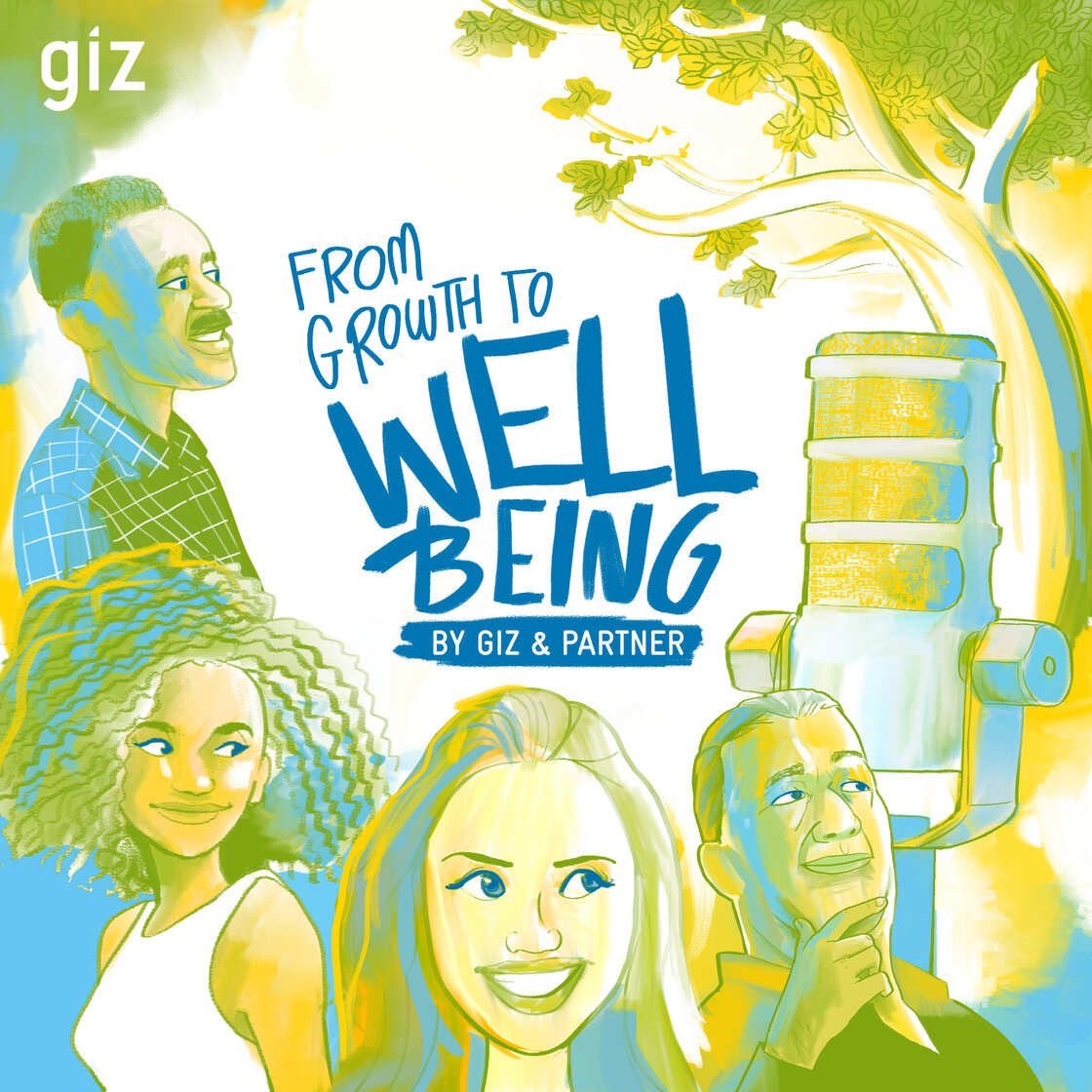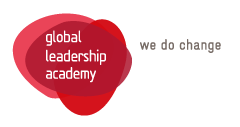From Growth to Wellbeing
A Podcast by GIZ and Partners
The devastating impacts of climate change, rising inequalities within and across countries, increasing fragility and global health emergencies demand a rethinking of socio-economic practices and systems that follow the economic growth paradigm. The world faces profound economic, environmental, and social challenges, as the international community comes to realize that the basic requirements and consumption needs of an ever-growing population cannot be sustainably met by simply maximizing economic output.
The 2022 GIZ Future Forum “From Growth to Wellbeing: Rethinking Development for a Digital, Green, and Just Transformation” aimed at shaping the debate on how to shift economic thinking towards combining progress across all dimensions of sustainable development and harnessing emerging potentials for development. The debate addressed various leverage points for a transformation of economic and social development respecting planetary boundaries and centered on human wellbeing.
Learn more about the Future Forum 2022 here.
To this aim, alongside the Future Forum, we produced a podcast series „From Growth to Wellbeing. By GIZ & Partners”. In this series of seven episodes, Alissa Stein, our podcast host, invited to discuss concepts of economic transformation currently hotly debated. The podcast provides different perspectives from renown experts and practitioners.
The podcast intends to offer food for thought to innovate and learn from each other in an interdisciplinary, cross-sectoral exchange, shareing our lessons learnt with the wider international development community. Below, you will find an overview of the topics and questions covered. For full episodes, make sure you subscribe on your preferred platform.

The first episode provides a perspective on Just Transition to ensure that the necessary changes to limit global warming do not result in negative impacts on vulnerable stakeholders and communities. Alissa Stein discusses challenges and opportunities with Esther May (Advisor and Just Transition focal point within Climate Cluster South Africa, GIZ) and Timon Wehnert (Head of Berlin Office and Senior Researcher, Future Energy and Industry Systems, Wuppertal Institute).
The focus lies on explaining the circular economy approach which provides a convincing alternative to our harmful linear system of production and consumption. In a circular economy, value is maintained as long as possible, and resources are fed back into value chains. Together with our podcast host, Alissa Stein, Elisaveta Kostova (Manager for the Green Action in Enterprises Project in Jordan, GIZ) and Jules Lennon (Programme Manager Circular Fashion, Ellen Mac Arthur Foundation) discuss the most important aspects of Circular Economy.
This episode focusses on whether and how hydrogen produced from renewable sources (“green H2”) may help economies moving away from fossil energy sources to actively strive towards a social and green economic transformation. The three interviewees are Andreas Stamm (Geographer at the German Institute of Development and Sustainability researching on the transformation of economic and social systems) and Rita Strohmaier (Senior Researcher at the German Institute of Development and Sustainability researching on the transformation of economic and social systems) representing the scientific perspective as well as Steven Hofmann (Advisor Green Hydrogen (H2) Programme South Africa, GIZ) for the development cooperation implementation perspective.
Three interviewees shed light on different perspectives in relation to the debate about why governments and institutions around the world should move from economic growth to wellbeing to guide their decision-making. They discuss the reasons governments and institutions develop more holistic conceptions and measures of progress to respond to the cascading crises of our time. Our guests are Lucia De Carlo (Director of Division “Sustainable Economic Policy, Financial Systems Development”, BMZ), Lorenzo Fioramonti (Professor of Political Economy, University of Pretoria and GLAC member), and Ulrich Höcker (Director of Division “Economic and Social Development, Employment”, GIZ).
This episode provides a perspective on how to move towards a wellbeing-oriented approach to development thinking and practice. The two interviewees are Romina Boarini (Director of the OECD Centre for WISE) and Jayati Ghosh (Professor of Economics at the University of Massachusetts Amherst).
This episode provides different perspectives on the transformation of the economic model and how that would look like in practice. The three interviewees are Manfred Haebig (Sustainable Economic Development Program Manager, Head of GIZ ECLAC Cooperation Programme), Amanda Janoo (Economics and Policy Lead for WEALL) and José Luis Samaniego (Director of the Sustainable Development and Human Settlements Division of the ECLAC).
Rapid changes and new risks, induced through digitalization, globalization and climate change, threaten to erode livelihoods and wellbeing at global level, especially for the poor and marginalized population groups. In this context, resilience describes the ability to better deal with changes and risks – “to bounce back” or recover after an external shock has happened while mitigating structural damage. This podcast episode sheds light on how we can strengthen environmental, social and economic resilience in all dimensions of sustainable development – for example through building reliable social protection systems, “greening” carbon-intensive industries, and protecting natural assets or public goods. We discuss with Anna McCord, a sociologist and economist with three decades of experience in international cooperation. She is currently focusing on social protection as a response to climate change-induced livelihoods and environmental degradation. Rajeev Ahal, director of the GIZ Enhancing Rural Resilience through Appropriate Development Actions (ERADA) programme, will share his experiences with India’s public works programme MGNREGA, and how it contributes to household and community resilience.
Full episodes are available on the following podcast streaming providers:
Podigee, Spotify, Amazon Music, Deezer and Google Podcast.
Factsheets
Factsheets
The following factsheets provide further ressources on the topics and questions covered in the podcast episodes above.
Just Transition
Why should we move from growth to wellbeing?
WHAT WOULD A MOVE FROM ECONOMIC GROWTH TOWARDS WELLBEING MEAN FOR DEVELOPMENT?
HOW DO WE MOVE FROM ECONOMIC GROWTH TOWARDS WELLBEING IN PRACTICE?
Get in touch
Please share your feedback and comments with us by sending an e-mail to wellbeing-podcast@giz.de.
